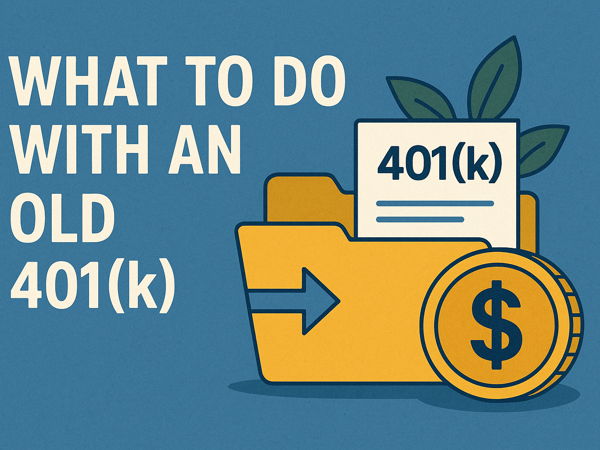
Share this Post
What Should You Do With an Old 401(k)? A Guide for Self-Employed Pros and Realtors®
What Should You Do With an Old 401(k)?
If you are a real estate agent or self-employed professional who left a W-2 job to chase a bigger dream, there's a good chance you left behind something else too—your old 401(k). Now what?
It’s one of the most common questions I get asked: “What should I do with an old 401(k) or 403(b) from a previous employer?”
Whether you have got one old retirement account or five floating around in financial limbo, the decision you make can significantly impact your long-term wealth. Here's a breakdown of your main options.
Option 1: Leave It Where It Is (But Know the Rules)
Sometimes, the simplest choice is to do nothing. Many employer-sponsored retirement plans let you keep your money in the account even after you leave the company. This can be a strategic short-term move—especially if you’re launching your own business and don’t want to make hasty decisions.
That said, don’t forget: some plans may force you to roll the money out or automatically move it into an IRA. Plus, keeping it there could mean you’re paying higher fees, have limited investment options, or simply forget it exists—none of which supports your financial goals.
Pro Tip: If the 401(k) offers great fixed-rate or low-cost options—or allows incoming rollovers to support advanced tax planning strategies like Roth conversions—leaving it may be worth it. Just don’t leave it out of sight and out of mind.
Option 2: Roll It Into Your New Employer’s Retirement Plan
If you’ve started a new job or set up your own solo 401(k), SEP IRA, or SIMPLE IRA, you can often roll your old 401(k) into your new retirement plan.
This strategy can help consolidate your retirement savings into one place, making it easier to track progress and stay organized. Plus, it allows your money to remain tax-deferred, avoiding penalties and unnecessary taxes.
This can be especially powerful for real estate agents who thrive on simplicity in their financial systems, so they can spend more time selling homes and less time managing accounts.
Option 3: Roll It Into an IRA—The Most Flexible Route
The third, and often most strategic, option is to roll your old 401(k) into an Individual Retirement Account (IRA). Why is this often the go-to strategy? Flexibility.
Unlike a 401(k), an IRA opens the door to a vast universe of investment options—stocks, bonds, ETFs, real estate investment trusts, and more. And that’s crucial if you want your portfolio to reflect your goals, risk tolerance, and timeline.
Think of an IRA as your retirement command center. Instead of juggling multiple employer plans over the years, each time you transition careers or employers, you simply roll the 401(k) into your central IRA. One account. One strategy. Less confusion.
Bonus: Reducing the number of times your investments are sold and repurchased (which happens when rolling from one 401(k) to another) allows your money to grow more efficiently over time—aligned with long-term, buy-and-hold success.
A Few More Things You Need to Know
Your 401(k) isn't lost. Even if you left that job decades ago and barely remember the provider, your retirement money is tied to your Social Security number. With a little detective work (usually calling the old HR department or plan provider), you can track it down.
Match the account types. Pre-tax money needs to go to a pre-tax IRA or 401(k); Roth money should go to a Roth IRA or Roth 401(k). Mixing them up can create a surprise tax bill—one that you definitely want to avoid.
No, you can’t combine it with your spouse’s account. Retirement accounts are individually owned for tax purposes. Each spouse will need their own account, even if you’re managing everything together in your household plan.
Why This Matters—Especially for Self-Employed Pros
Retirement is likely the most expensive thing you’ll ever do. And if you’re self-employed or in real estate, you don’t have a corporate benefits department guiding your financial future. You are the benefits department. That means making smart choices with your old 401(k) isn’t just a good idea—it’s critical.
Rolling over your old 401(k) into a well-managed IRA or retirement plan aligned with your goals keeps your money working for you. And that’s how you build a confident financial future—one that supports the life and lifestyle you’re working so hard to create.
Need Help?
Don’t let indecision or complexity keep you stuck. At PeaceLink Financial Planning, we specialize in helping self-employed professionals and realtors like you align your financial strategy with your life goals.
